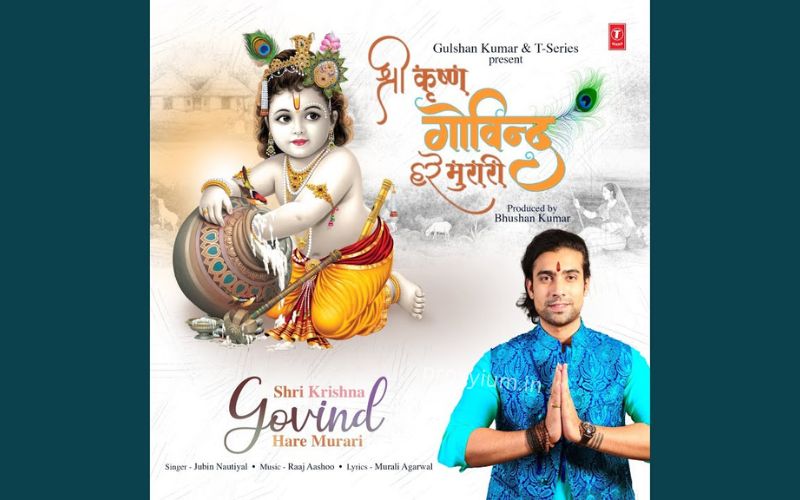Jubin Nautiyal is a renowned Indian playback singer who has captivated audiences with his soulful and emotive renditions of various songs. One of his most celebrated works is his interpretation of the devotional hymn “Shri Krishna Govind Hare Murari.” This timeless devotional piece has been a cherished part of Hindu religious and cultural traditions for centuries, and Jubin Nautiyal’s rendition has brought it to the forefront of contemporary Indian music.
In this article, we will delve into the significance of “Shri Krishna Govind Hare Murari,” explore Jubin Nautiyal’s interpretation of the lyrics, and examine the impact and popularity of his version. We will also discuss the spiritual and cultural importance of devotional songs in India, as well as Jubin Nautiyal’s journey as a singer and his contribution to the music industry.
Background and significance of “Shri Krishna Govind Hare Murari” in Hinduism
“Shri Krishna Govind Hare Murari” is a devotional hymn that holds immense significance in Hinduism. The lyrics are a part of the “Vishnu Sahasranam,” a Sanskrit text that lists the thousand names of the Hindu deity Vishnu. The hymn is a powerful invocation of the divine qualities and attributes of Lord Krishna, who is considered an avatar of Vishnu.
The lyrics of “Shri Krishna Govind Hare Murari” are a profound expression of devotion and reverence towards the divine. The words “Shri Krishna Govind Hare Murari” are a mantra that encapsulates the essence of Krishna’s divine nature, with each name carrying deep spiritual significance. The hymn is often recited or sung during Hindu religious ceremonies, festivals, and personal devotional practices, serving as a means to connect with the divine and seek blessings.
Exploring the lyrics of “Shri Krishna Govind Hare Murari”
The lyrics of “Shri Krishna Govind Hare Murari” are as follows:
Shri Krishna Govind Hare Murari,
Hare Krishna Govind Hare Murari,
Shri Krishna Govind Hare Murari,
Hare Krishna Govind Hare Murari.
The meaning of the lyrics can be broken down as follows:
- “Shri Krishna” – Shri is an honorific term that denotes reverence and respect, while Krishna is the name of the divine avatar.
- “Govind” – This name refers to Krishna as the protector and nourisher of the world.
- “Hare” – This is an invocation of the divine energy or power.
- “Murari” – This name signifies Krishna as the slayer of the demon Mura.
The repetition of these names and the rhythmic chanting create a powerful mantra that invokes the presence and blessings of Lord Krishna.
Jubin Nautiyal’s interpretation and musical style in the song
Jubin Nautiyal’s rendition of “Shri Krishna Govind Hare Murari” showcases his exceptional vocal abilities and his deep understanding of the spiritual and cultural significance of the hymn. His interpretation is marked by a soulful and emotive delivery, with his voice effortlessly gliding through the melodic phrases and conveying the devotional essence of the lyrics.
Jubin’s musical style in this rendition is characterized by a blend of traditional and contemporary elements. He maintains the devotional and contemplative nature of the hymn while infusing it with his own unique musical sensibilities. The arrangement features a mix of classical Indian instrumentation, such as the harmonium and tabla, alongside subtle modern production elements that enhance the overall listening experience.
Jubin’s interpretation is particularly noteworthy for its ability to captivate both traditional and contemporary audiences. His rendition strikes a delicate balance between preserving the sacred nature of the hymn and making it accessible to a wider audience, thereby expanding the reach and appreciation of this timeless devotional piece.
The impact and popularity of Jubin Nautiyal’s version of “Shri Krishna Govind Hare Murari”
Jubin Nautiyal’s rendition of “Shri Krishna Govind Hare Murari” has garnered widespread acclaim and popularity among music enthusiasts and devotees alike. The song has amassed millions of views on various digital platforms, and has become a staple in the repertoire of Jubin’s live performances.
One of the key factors contributing to the song’s success is Jubin’s ability to connect with the listeners on a deep, emotional level. His soulful delivery and heartfelt interpretation of the lyrics have resonated with audiences, both in India and across the globe. The song has become a source of solace and spiritual nourishment for many, serving as a means to connect with the divine and find inner peace.
Furthermore, Jubin’s rendition has also played a significant role in introducing this timeless devotional hymn to a younger generation of music listeners. By presenting it in a contemporary and accessible manner, he has helped to preserve and revive the rich cultural heritage of India’s devotional music traditions.
Other notable renditions of “Shri Krishna Govind Hare Murari”
While Jubin Nautiyal’s version of “Shri Krishna Govind Hare Murari” has gained immense popularity, it is important to acknowledge the numerous other notable renditions of this devotional hymn throughout history. Some of the most renowned interpretations include:
- Pandit Bhimsen Joshi: The legendary classical vocalist Pandit Bhimsen Joshi’s rendition of “Shri Krishna Govind Hare Murari” is widely regarded as a seminal work in the realm of Hindustani classical music.
- Lata Mangeshkar: The iconic playback singer Lata Mangeshkar’s soulful and emotive version of the hymn has been cherished by devotees and music enthusiasts alike.
- Anup Jalota: The renowned bhajan singer Anup Jalota’s rendition of “Shri Krishna Govind Hare Murari” has been a staple in the devotional music circuit for decades.
- Bombay Jayashri: The acclaimed classical vocalist Bombay Jayashri’s interpretation of the hymn showcases her exceptional command over Carnatic music traditions.
These diverse renditions, each with their own unique artistic expression, have contributed to the enduring legacy and cultural significance of “Shri Krishna Govind Hare Murari” in the Indian musical landscape.
The spiritual and cultural significance of devotional songs in India
Devotional songs, or “bhajans,” hold a profound and enduring place in the cultural and spiritual fabric of India. These songs serve as a means of connecting with the divine, expressing devotion, and seeking spiritual enlightenment. They are deeply rooted in the rich traditions of Hinduism, and have been passed down through generations, serving as a unifying force that transcends geographical and linguistic barriers.
Devotional songs, such as “Shri Krishna Govind Hare Murari,” play a crucial role in the religious and cultural practices of Hindus. They are often sung during festivals, temple rituals, and personal devotional practices, providing a sense of community, belonging, and spiritual nourishment. These songs are not merely a form of entertainment, but rather a vehicle for the expression of deep-seated beliefs, values, and aspirations.
The enduring popularity and significance of devotional songs in India can be attributed to their ability to evoke a profound emotional and spiritual response in the listener. The lyrics, often in the form of mantras or hymns, resonate with the innermost desires of the devotees, offering solace, guidance, and a connection to the divine. This powerful bond between the devotee and the divine is a testament to the enduring cultural and spiritual legacy of devotional music in India.
Analyzing the success and reach of Jubin Nautiyal’s rendition on social media platforms
Jubin Nautiyal’s rendition of “Shri Krishna Govind Hare Murari” has enjoyed immense success and widespread reach on various social media platforms. The song’s popularity can be attributed to several factors, including:
- Engagement and Interaction: Jubin’s fans have actively engaged with the song, leaving comments, sharing it with their networks, and participating in discussions around the spiritual and cultural significance of the hymn.
- Viral Potential: The song’s captivating melody, Jubin’s emotive delivery, and the universal appeal of devotional music have contributed to its viral potential, leading to its widespread dissemination across social media.
- Multicultural Reach: Jubin’s rendition has resonated with audiences beyond the Indian subcontinent, with listeners from diverse cultural backgrounds appreciating the song’s spiritual and artistic merits.
- Algorithmic Amplification: The song’s strong performance on platforms like YouTube and Spotify has led to its increased visibility and recommendation to a wider audience, further expanding its reach and popularity.
The success of Jubin Nautiyal’s “Shri Krishna Govind Hare Murari” on social media platforms underscores the enduring appeal of devotional music and the power of digital platforms to connect artists with global audiences. It also highlights Jubin’s ability to captivate listeners and introduce them to the rich cultural heritage of India’s devotional music traditions.
Jubin Nautiyal’s journey as a singer and his contribution to the music industry
Jubin Nautiyal’s rise to prominence in the Indian music industry is a testament to his exceptional talent, dedication, and versatility as a singer. Starting his journey as a contestant on the popular reality show “India’s Got Talent,” Jubin has since established himself as one of the most sought-after playback singers in the country.
Throughout his career, Jubin has showcased his ability to seamlessly transition between genres, from soulful Bollywood ballads to energetic dance numbers, and from contemporary pop to timeless devotional hymns. His versatility and adaptability have allowed him to collaborate with a diverse range of musicians and composers, further expanding the scope of his artistic expression.
Jubin’s contributions to the music industry extend beyond his own musical output. He has also been a vocal advocate for the rights and well-being of fellow artists, using his platform to raise awareness and champion the cause of creative professionals. Additionally, his philanthropic efforts, including his work with various charitable organizations, have endeared him to his fans and the broader community.
As Jubin Nautiyal continues to captivate audiences with his exceptional vocal talent and his genuine connection with the music, he has cemented his place as a significant figure in the Indian music landscape. His rendition of “Shri Krishna Govind Hare Murari” is just one example of his ability to seamlessly blend traditional and contemporary elements, while upholding the rich cultural heritage of India’s devotional music.
Conclusion
Jubin Nautiyal’s rendition of “Shri Krishna Govind Hare Murari” is a testament to the enduring power of devotional music and its ability to transcend boundaries and connect people on a spiritual and emotional level. Through his soulful interpretation, Jubin has not only paid homage to the rich cultural heritage of this timeless hymn but has also introduced it to a new generation of music enthusiasts.
The success and popularity of Jubin’s version of “Shri Krishna Govind Hare Murari” serve as a reminder of the profound impact that devotional music can have on the human spirit. By tapping into the universal language of the divine, Jubin has created a work of art that resonates with listeners across the globe, offering them a glimpse into the profound spiritual and cultural traditions of India.
As you continue to explore the depths of Jubin Nautiyal’s rendition and the significance of “Shri Krishna Govind Hare Murari” in the broader context of Indian music and spirituality, we encourage you to embrace the transformative power of devotional songs and their ability to connect us with the divine.
To delve deeper into the world of Jubin Nautiyal’s music and explore more of his captivating renditions, be sure to visit his official website and follow him on social media platforms. There, you can discover his latest releases, upcoming performances, and engage with a community of music enthusiasts who share your passion for his soulful interpretations.





